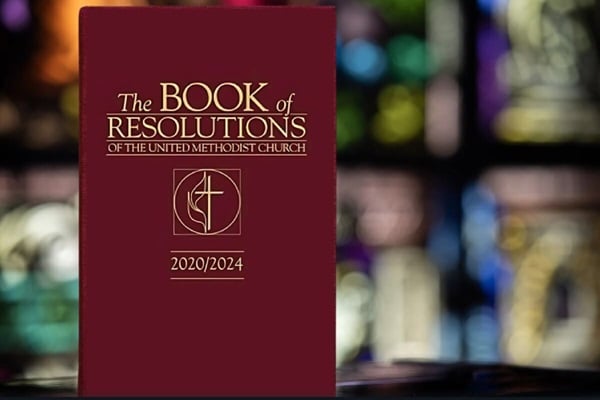All articles in this series may be found here as they are published.
- The new opening section of resolutions in the Book of Resolutions, "The Community of All Creation," includes four resolutions submitted for and adopted by the 2024 General Conference.
- Each of these resolutions calls for local churches and other expressions of United Methodist institutional life to take concrete, direct actions to mitigate climate change and/or reverse damage done to the earth and its creatures by human activities.
- Two of the previously existing resolutions were also substantially modified to increase specificity and strengthen their impact.
The 2020/2024 Book of Resolutions has been reorganized to align with the organization of the revised Social Principles, also approved by the 2024 General Conference. The new resolutions in the retitled opening section of resolutions, Community of All Creation, call for concrete, specific actions by United Methodists at all levels of church lfe to mitigate climate change and/or reverse damage done to the earth and its creatures by human activities.
What's new?
Resolutions 1214-1217 were newly submitted and adopted by the 2024 General Conference.
The first three of these place The United Methodist Church at the forefront of resistance to policies of any nation that seeks to ignore or reverse progress toward net-zero greenhouse gas emissions and the end of reliance on non-renewable energy.
Resolution 1214, "Church Land Use," calls for "all local churches and other holders of church lands... bring their land back in harmony with God's intentions and systems." Among the specific action steps this resolution calls for are a regular evaluation and actions to maximize native vegetation and reduce non-native and invasive species, to plant at least three native trees in a cluster, to replace at least half of the lawn with native plant species, to end the use of synthetic fertilizers, pesticides and biocides, and to convert at least part of the energy needed for building operations to renewable energy sources, among others. Companion policies adopted in the Book of Discipline call for local church trustees to perform annual audits of the carbon footprint of the church's campus, to report these to the charge conference, and to implement plans to reduce that footprint to net-zero (Paragraphs 2533.8 and 2550.11).
"Commitment to Net-Zero Greenhouse Gas Emissions" urges United Methodists and every congregation to support the ongoing work of the Council of Bishops and the general agencies to achieve net-zero carbon emissions for their work by 2050.
Resolution 1216, "Recognizing United Methodist Support for Global Green New Deal Initiatives and Legislative Efforts" states the wholehearted support of The United Methodist Church for "legislative and policy efforts by governments around the world akin to the "Green New Deal," asks United Methodists to call on world leaders to promote such initiatives, and for leaders within the United Methodist Church, at all levels, to "place climate justice... at the forefront of their preaching, teaching, and programmatic ministries."
The fourth new resolution in this section, "Use of Plastic," (Resolution 2017) expects United Methodist institutions at every level of denominational life, from the local church to the General Conference, especially in meetings, to avoid single-use plastics and replace them where needed with either fully-recyclable non-plastic items, or better, reusable items.
What's been reworked?
"World's Population and the Church's Response" (Resolution 1101) and "Energy Policy Statement" (Resolution 1120) were substantially amended by the General Board of Church and Society, which submitted them.
In addition to updates to basic population data and projections and edits to decrease wordiness and enhance readability of the resolution, the updated version of "World's Population and the Church's Response" calls on people of "all faith traditions to consider how their theological views about contraception may inhibit the development of women and the world." This version also strengthens the language calling for Iran, Syria the United States, the only three nations not to ratify the UN Convention on the Elimination of All Forms of Discrimination Against Women, to do so.
"Energy Policy Statement" adds several new or strengthened policy positions. It now rejects processes of generating energy from plant-based materials, food crops, and industrial waste because of the impacts of these practices on food security and deforestation, among others. The statement on nuclear energy now focuses more intently on the dangers involved at all stages of nuclear energy production, from mining to transit of nuclear waste, especially on indigenous populations whose lands are mined and people living in low-income areas through which waste materials are routinely routed. It now includes a call for a moratorium on all future development of nuclear energy and re-affirms the support of the denomination "for a full phase-out of nuclear production for the purpose of creating weapons." It now also commits every level of the denomination, including local churches, to "model rapid transition to clean renewable energy." And it rejects "emissions trading" schemes on the grounds that they "often perpetuate environmental injustice with continued emission impacts in countries and communities with fewest resources."
Taken together with the previous statements that were readopted in 2024, these additions and changes in the Book of Resolutions call United Methodists into the forefront of both on the ground efforts and advocacy for policy decisions to help bring about the ideal of a community of all creation.
Burton Edwards serves as Lead for Ask The UMC, the United Methodist Information Service.





